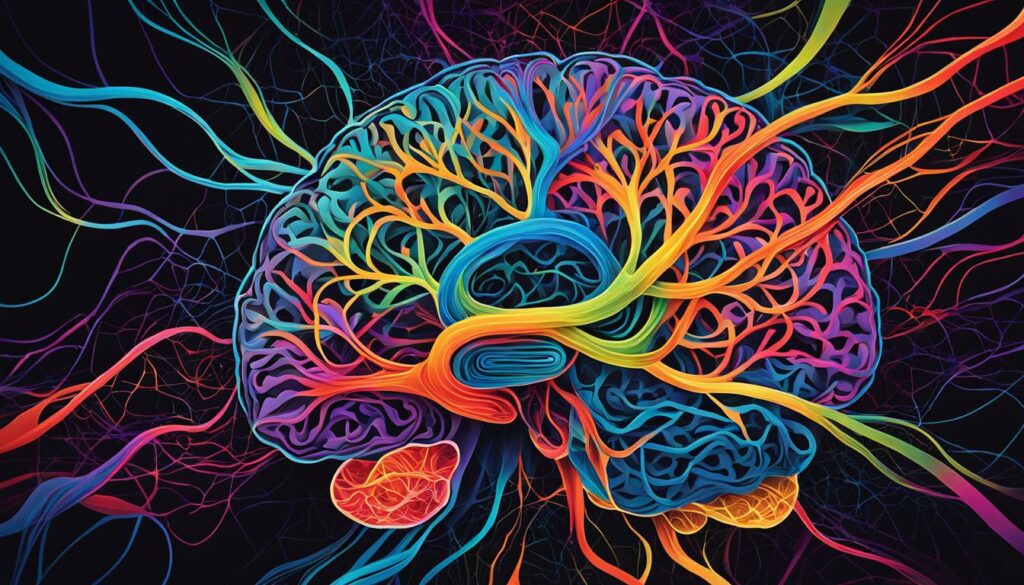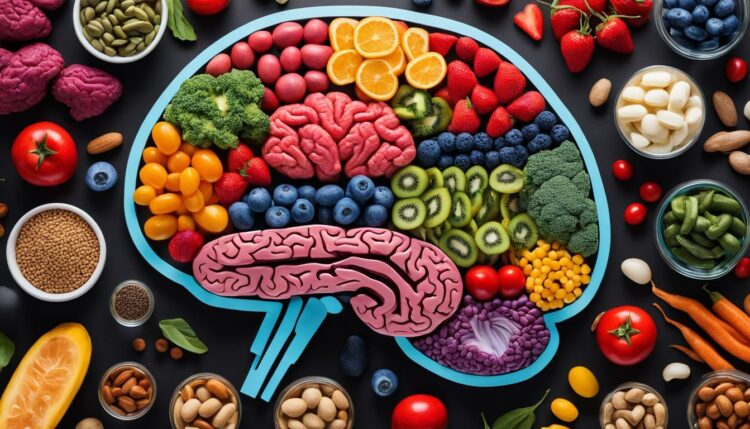Sex is not only a pleasurable activity but also has a fascinating impact on the brain.
Recent studies have revealed that sexual activity can influence various aspects of brain health, including cognitive function and sexual performance.
The release of hormones during sex, such as dopamine and oxytocin, contributes to feelings of pleasure, relaxation, and bonding. Additionally, sexual activity activates specific brain regions associated with emotions, pain processing, decision-making, and reward.
Key Takeaways:
- Sexual activity stimulates the release of hormones like dopamine and oxytocin, which positively impact cognitive function and overall brain health.
- The brain regions involved in sexual arousal and orgasm overlap with those associated with emotions, pain processing, decision-making, and reward.
- Sexual activity can improve sleep quality, memory performance, and cognitive functioning, particularly in older adults.
- However, rare cases of transient global amnesia and postcoital dysphoria have been reported as potential risks.
- Maintaining a balanced lifestyle, including a healthy diet and engaging in cognitive-stimulating activities, is essential for optimal brain health.
How Sexual Activity Affects the Brain in Men
During sexual activity, the brain experiences remarkable changes that can have a profound impact on cognitive and emotional processes.
Studies have revealed fascinating insights into how penile stimulation during sex can activate specific brain regions and elicit various responses. One significant finding is that penile stimulation increases blood flow in key brain regions, such as the posterior insula and secondary somatosensory cortex.
These areas play a crucial role in processing emotions and sensations of pain, suggesting that sexual stimulation activates brain regions associated with pleasure and sensory experience.
The activation of the cerebellum during ejaculation is intriguing. It resembles the reward response triggered by pleasurable activities like listening to music or experiencing other enjoyable sensations.
This correlation suggests that sexual stimulation in men can activate brain regions associated with pleasure, emotional processing, and reward.
Understanding the specific brain regions involved in sexual stimulation offers valuable insights into the intricate connections between the brain and sexual experiences.
By unraveling these complexities, researchers can gain a deeper understanding of human sexuality and its impact on cognitive and emotional well-being.
How Sexual Activity Affects the Brain in Women
Brain imaging studies have revealed fascinating insights into the intricate workings of the female brain during orgasm.
Multiple brain regions are activated during this intense and pleasurable experience, providing a deeper understanding of the neural processes involved. These brain regions include the prefrontal cortex, orbitofrontal cortex, insula, cingulate gyrus, and cerebellum.
The prefrontal cortex, responsible for decision-making and emotional regulation, shows increased activity during female orgasm. This suggests that the brain is engaged in processing and evaluating the pleasurable sensations and emotions associated with orgasm.
The orbitofrontal cortex, which plays a crucial role in reward processing and pleasure, is also highly active. The insula, located deep within the brain, is responsible for processing sensory information and plays a role in experiencing pleasure and pain.
During orgasm, the insula exhibits heightened neural activity, indicating its involvement in the intense sensory experience. Another brain region that shows increased activation during female orgasm is the cingulate gyrus.
This area is associated with emotional processing, pain perception, and the regulation of some metabolic processes. Its activation during orgasm suggests a connection between pleasure, emotional processing, and physiological responses.
The cerebellum, often associated with motor control and coordination, also plays a role in the experience of orgasm. Its activation during this intense sexual experience highlights the intricate connections between pleasure, motor responses, and sensory perception.
The rhythmic and pleasurable stimulation associated with orgasm can induce a trance-like state in the brain, akin to the effects of music or dancing. The brain experiences heightened states of neural rhythm and sensory absorption, further enhancing the profound pleasure of orgasm.

By understanding the brain regions activated during female orgasm, we gain valuable insights into the complexities of human sexual experiences.
The intricate interplay of emotions, sensations, and decision-making processes during orgasm demonstrates the remarkable capabilities of the female brain.
Sex and Mood Regulation
Sex has a powerful impact on mood regulation, influencing our emotions and stress levels. One of the key hormones released during sexual activity is oxytocin, often referred to as the “love hormone.”
Oxytocin plays a crucial role in reducing stress and promoting relaxation. It counteracts the effects of cortisol, the stress hormone, and helps create a sense of calm and well-being.
This hormonal response is one of the reasons why sex can be such a powerful stress-reliever. In addition to its role in stress reduction, oxytocin also has analgesic properties, meaning it can reduce pain perception.
This hormone has been found to alleviate headaches and cluster headaches, providing relief for those experiencing pain. Studies have shown that the release of oxytocin during sexual activity can have a positive impact on pain management.
By reducing pain perception, oxytocin contributes to the overall experience of pleasure and relaxation during sex.
The Effects of Oxytocin on Mood
“Oxytocin is often referred to as the ‘cuddle hormone’ because it is associated with feelings of trust, bonding, and intimacy. Its release during sex can enhance emotional connection and foster a sense of closeness between partners.”
While oxytocin has many positive effects on mood, it’s important to note that individuals may have unique responses to sexual activity. Some people may experience postcoital dysphoria, which refers to feeling sad or agitated after sex.
This can be attributed to various factors, such as past traumatic events or biological predisposition.
It’s worth mentioning that the impact of sex on mood regulation can vary from person to person. Factors such as individual experiences, relationship dynamics, and overall well-being can influence the emotional response to sexual activity.
Overall, sex and the release of oxytocin can have a profound impact on mood, reducing stress levels, and promoting relaxation. However, it’s essential to remember that everyone’s experience is unique, and individual factors can influence the emotional response to sexual activity.
Nutrients That Boost Cognitive Health
Indulging in tasty food can spark the release of dopamine and endorphins, enhancing your sense of pleasure. Enjoying a meal with a loved one and engaging in cooking together can further elevate oxytocin levels.
When planning meals for a boost in happy hormones, consider these points:
- Spicy dishes may prompt the release of endorphins.
- Foods like yogurt, beans, lean meats, and almonds are associated with dopamine release.
- Tryptophan-rich foods, beef, lamb, pork, poultry, and dairy, as well as in nuts and seeds, whole grains, and legumes are linked to higher serotonin levels.
- Probiotic-rich foods, including yogurt, kimchi, and sauerkraut, can affect hormone release.
Consider Supplements Various supplements might aid in increasing levels of happy hormones. Some options to explore include:
- Tyrosine for dopamine production. (cheese, also found in chicken, turkey, fish, dairy products and most other high-protein foods)
- Green tea and its extract for dopamine and serotonin.
- Probiotics for serotonin and dopamine production.
- Tryptophan for serotonin. (beef, lamb, pork, poultry, and dairy, as well as in nuts and seeds, whole grains, and legumes)
Research on the effectiveness of these supplements shows mixed results, with many studies focusing on animals.
Further research is necessary to confirm their benefits for human health.
Nutrients That Boost Sexual Health
Incorporating nitric oxide-boosting foods into your diet can improve blood pressure, blood flow, exercise performance, and overall sexual health.
Here’s a link to the top 10 Foods to Naturally Boost Nitric Oxide for enhanced sexual health
Sex and Sleep Quality
Sexual activity can have a positive impact on sleep quality and overall sleep patterns. This is attributed to the release of hormones such as prolactin, which plays a crucial role in sleep regulation.
Prolactin, a hormone released after orgasm, has sedative effects on the body, promoting a better night’s sleep.
This hormone helps to induce feelings of relaxation and calmness, making it easier to fall asleep and stay asleep throughout the night. Interestingly, ejaculation, a natural outcome of sexual activity, has been found to reduce activity in the prefrontal cortex, a brain region associated with sleep quality.
By reducing prefrontal cortex activity, ejaculation can help quiet the mind and promote a deeper and more restful sleep. Sleep is essential for cognitive function, memory recall, and overall brain health.
Studies suggest that sexual activity can contribute to better cognitive functioning and improved memory, particularly in older adults.
Benefits of Sexual Activity for Sleep:
- Release of sleep-regulating hormone prolactin
- Induction of relaxation and calmness
- Reduction of prefrontal cortex activity
- Promotion of deeper and more restful sleep
- Potential enhancement of cognitive function and memory recall
By prioritizing a healthy sex life, individuals can potentially improve their sleep quality, which in turn can have positive effects on overall brain health and well-being.

Sexual activity can have a significant impact on sleep quality and brain function.
The release of hormones like prolactin during sex promotes relaxation and deeper sleep, while ejaculation reduces prefrontal cortex activity, aiding in sleep initiation and maintenance.
Prioritizing a healthy sex life may contribute to better sleep patterns and improved cognitive function.
The Benefits and Risks of Sex on Brain Health
Sex can have both positive and negative effects on brain health. While it is known to contribute to feelings of pleasure and relaxation, there are also some risks associated with sexual activity.
The exposure to semen during unprotected sex has been linked to lower scores of depression in women who do not use barrier methods of protection. Semen contains various compounds such as oxytocin, serotonin, and melatonin, which are believed to have mood-stabilizing properties.
However, it is important to note that rare cases of transient global amnesia (TGA) have been reported after sexual encounters. Transient global amnesia is a temporary loss of memory function characterized by a sudden inability to recall recent events or form new memories.
The exact cause of TGA after sex is still unclear, but it is thought to be related to the intense physical exertion and changes in blood flow that occur during sexual activity.
Additionally, some individuals may experience postcoital dysphoria, also known as post-sex blues. This phenomenon is characterized by feelings of sadness, irritability, or anger after sex.
The reasons behind postcoital dysphoria are complex and can vary from individual to individual. Past traumatic events, hormonal fluctuations, or psychological factors may contribute to this emotional response.
Overall, the impact of sex on brain health is multifaceted and can have both positive and negative effects.
Further research is needed to better understand the mechanisms underlying these effects and to identify individuals who may be more susceptible to the risks associated with sexual activity.
Benefits and Risks of Sex on Brain Health
| Benefits | Risks |
|---|---|
| – Improved mood | – Rare cases of transient global amnesia |
| – Relaxation and bonding | – Postcoital dysphoria |
It’s important to remember that individual experiences may vary, and it is essential to prioritize open communication and understanding within sexual relationships.
If you have concerns about the potential risks or effects of sex on your brain health, it is recommended to consult with a healthcare professional.
Other Factors Influencing Brain Health
In addition to sexual activity, several other factors can significantly impact brain health. Let’s explore how video games, alcohol consumption, high-fructose diets, and excessive TV watching can affect our cognitive well-being.
The Impact of Video Games on Brain Health
Playing video games has been found to have both positive and negative effects on the brain.
On one hand, certain types of video games can improve hand-eye coordination and spatial reasoning skills, leading to increased brain cell count in specific regions. This can enhance cognitive abilities and problem-solving skills.
On the other hand, excessive gaming can lead to addiction and poor time management, negatively impacting mental health and overall brain function. It is essential to maintain a balance and engage in other activities that promote social interaction and physical exercise.
The Effects of Alcohol on Brain Health
Moderate alcohol consumption has been associated with potential brain health benefits in older adults. Some studies suggest that consuming small to moderate amounts of alcohol may reduce the risk of cognitive decline and dementia.
However, it is crucial to note that excessive alcohol consumption can lead to detrimental effects on brain health, including impaired cognitive function, memory loss, and increased risk of alcohol-related brain damage.
The Effect of High-Fructose Diet on Brain Function
A diet high in fructose, a type of sugar commonly found in sugary beverages and processed foods, can have adverse effects on brain function. Studies have shown that a high-fructose diet may impair synaptic activity and hinder clear thinking.
Additionally, excessive fructose consumption has been linked to a higher risk of obesity and metabolic disorders, which can further impact brain health.
Excessive TV Watching and Mental Acuity
Spending excessive time watching television has been associated with decreased mental acuity and attention disorders. Prolonged sedentary behavior, such as sitting for long hours while watching TV, can lead to reduced physical activity, which is vital for maintaining overall brain health.
It is essential to engage in activities that stimulate the mind, such as reading, puzzle-solving, or engaging in hobbies, to promote cognitive function and mental well-being. Overall, while video games, alcohol consumption, high-fructose diets, and excessive TV watching can have effects on brain health, moderation and balance are key.
Engaging in a variety of activities, adopting a healthy and balanced diet, and maintaining an active lifestyle can contribute to optimal brain function and overall well-being.
Conclusion
Sex not only brings pleasure and intimacy but also offers numerous benefits for brain health. Through the release of hormones like dopamine and oxytocin, sexual activity can enhance emotions, pain perception, and cognitive function.
It contributes to feelings of pleasure, relaxation, and bonding, promoting overall well-being. Engaging in regular sexual activity has been linked to improved sleep quality, memory performance, and cognitive functioning, particularly in older adults.
The release of hormones like oxytocin during sex helps relieve stress, reduce pain perception, and promote a better night’s sleep. This enhances brain health and supports optimal cognitive function.
While sex offers tremendous brain health benefits, it’s important to be aware of potential risks. Rare cases of transient global amnesia and postcoital dysphoria have been reported, highlighting the need for individual consideration and awareness.
A balanced lifestyle that includes a nutritious diet, regular exercise, and engaging in cognitive-stimulating activities is crucial for maintaining brain health. In conclusion, incorporating sexual activity as a part of a balanced lifestyle can have positive effects on cognitive function and overall brain health.
From enhancing emotional well-being to improving sleep quality and memory performance, sex plays a multifaceted role in supporting brain health.
By focusing on maintaining a balanced lifestyle, individuals can leverage the brain health benefits of sex and enjoy a fulfilling and thriving cognitive experience.
FAQ
How does sexual activity affect the brain in men?
Sexual activity in men can stimulate specific brain regions, such as the posterior insula and secondary somatosensory cortex, which are involved in processing emotions and sensations of pain.
The activation of the cerebellum during ejaculation is similar to the reward response triggered by pleasurable activities, suggesting that sexual stimulation activates brain regions associated with pleasure and emotional processing.
How does sexual activity affect the brain in women?
Brain imaging studies have revealed increased activity in several brain regions during female orgasm, including the prefrontal cortex, orbitofrontal cortex, insula, cingulate gyrus, and cerebellum.
These regions are involved in processing emotions, sensations of pain, decision-making, and regulation of some metabolic processes.
The rhythmic and pleasurable stimulation associated with orgasm can induce a trance-like state in the brain, similar to the effects of music or dancing, leading to heightened neural rhythm and sensory absorption.
How does sex impact mood regulation?
Sex releases hormones, such as oxytocin, that can improve mood and reduce stress. Oxytocin counteracts the effects of cortisol, the stress hormone, leading to feelings of relaxation. Oxytocin also has analgesic properties, reducing pain perception.
However, some individuals may experience postcoital dysphoria, feeling sad or agitated after sex. This could be due to past traumatic events or biological predisposition.
How does sex affect sleep quality?
Sexual activity can improve sleep quality due to the release of hormones like prolactin, which plays a role in sleep regulation.
Prolactin is released after orgasm and has sedative effects, promoting a better night’s sleep. In men, ejaculation has been found to reduce activity in the prefrontal cortex, a brain region associated with sleep quality.
What are the benefits and risks of sex on brain health?
Exposure to semen during unprotected sex has been associated with lower scores of depression in women who do not use barrier methods of protection. However, rare cases of transient global amnesia, a temporary loss of memory function, have been reported after sexual encounters.
Another phenomenon known as postcoital dysphoria, characterized by feelings of sadness or anger after sex, can also occur. These effects highlight the complex interactions between sex and brain health.
What are other factors influencing brain health?
Playing video games has been linked to improved hand-eye coordination and increased brain cell count in certain regions. Moderate alcohol consumption has been associated with better brain health in older adults.
Conversely, a high-fructose diet can impair synaptic activity, affecting clear thinking. Fluctuations in insulin levels and excessive TV watching have also been associated with decreased mental acuity and attention disorders.
What are the conclusions regarding cognitive function and sexual activity?
Sex has a profound impact on brain health, influencing emotions, pain perception, and cognitive function. The release of hormones during sexual activity, such as dopamine and oxytocin, contributes to feelings of pleasure, relaxation, and bonding.
Sexual activity can improve sleep quality, memory performance, and overall cognitive functioning, particularly in older adults. It’s important to maintain a balanced lifestyle, including a healthy diet, exercise, and engaging in cognitive-stimulating activities, to support optimal brain health.




